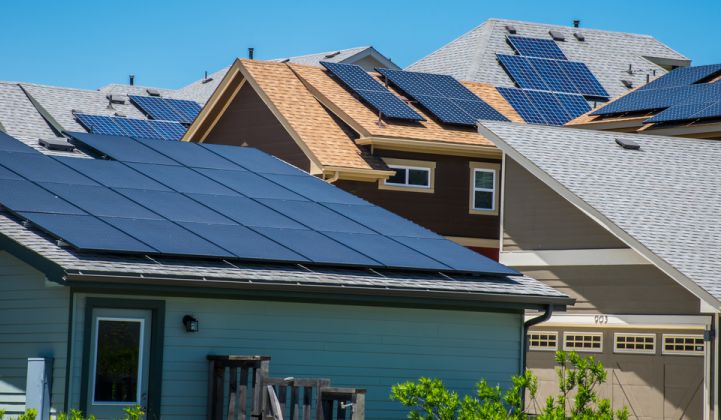Omnidian, a solar asset management firm offering performance guarantees on residential rooftop arrays, has revealed it secured $5.1 million in venture capital backing this summer.
The oversubscribed seed round funding, which closed in July but has yet to be formally announced, was led by Congruent Ventures, an early-stage venture capital firm that backs companies in the sustainability ecosystem.
Taking part alongside Congruent were City Light Capital, Blue Bear Capital, Energy Foundry, Ekistic Ventures and Avista Development, a wholly owned subsidiary of the Washington state utility Avista.
The backing represents Omnidian’s first major cash injection since October 2016, when the company received seed funding of $600,000, according to data on Crunchbase.
Omnidian offers residential solar owners a performance guarantee so any loss of production, below an agreed level, is reimbursed.
It has a software platform that integrates with third-party PV monitoring systems and identifies underperforming assets requiring a field service dispatch. The firm partners with a nationwide network of precertified field technicians who carry out repairs.
"Performance guarantees for residential solar energy present a major opportunity to create value for asset owners and help drive the next wave of growth in the residential solar market," said Abe Yokell, co-founder and managing partner of Congruent Ventures, in a press note.
"We see Omnidian as best positioned to seize this opportunity due to the extensive industry experience of the executive team, as well as the state-of-the-art technology they've developed in a short period of time," he added.
Omnidian claims its team now includes people who have been responsible for managing almost half of all residential solar systems in the U.S., with employees hailing from SolarCity, Sungevity, Spruce Finance and elsewhere.
The company’s three founders are also solar industry veterans.
CEO Mark Liffmann co-founded SunPower’s residential and light commercial business; chief operating officer David Kenny used to be a senior director at Sunrun; and chief strategy officer Ray Szylko, an ex-managing director at KPMG, was once a SunPower management consultant.
Liffmann said the company was aiming to reduce risks for individual and corporate owners of residential PV. Unless a rooftop system is leased out under a power-purchase agreement, as a homeowner, “you’re really on your own,” he said.
Many homeowners stop monitoring their rooftop solar systems after around six months, Liffmann told GTM, and only realize there is a problem when their electric bills shoot up to the levels they were seeing before they installed the system.
In a typical residential portfolio, between 5 percent and 10 percent of all systems might need remediation at some point in a given year, said Liffmann. Omnidian guarantees the performance for a flat annual fee of between $80 and $175 per system.
In little over a year, Omnidian has built up a portfolio including 100 megawatts of capacity under primary management, with a full performance guarantee in place, and more than 300 megawatts for which the company acts as a backup service provider.
The company said it doubled its assets under management in September alone.
The rush is partly a result of residential PV owners becoming more aware of the value of performance guarantees, but also down to companies such as Sungevity going bust and leaving their portfolios in the hands of investors that are not set up for asset management.
“As a portfolio owner, you have performance guarantees, so if your customer is not getting the energy that was being produced, then you have to pay damages or penalties,” explained Cedric Brehaut, a solar market analyst affiliated with GTM Research.
Omnidian is part of a growing group of startups targeting this sector, Brehaut said. Locus Energy, for example, offers a solar monitoring and data analytics service with similar functionality to Omnidian’s platform.
Elsewhere, SunSystem Technology specializes in providing field technicians, an area that Omnidian does not yet handle in-house.
“What’s unique to Omnidian is they are working with the backing of insurance companies, so they can offer portfolio-level performance guarantees,” said Brehaut. “That’s their unique selling point.”
It remains to be seen whether the concept would be economically viable or not, he said. But “it’s good news they have finished a funding round,” he commented. “It means there are investors thinking there is a problem to solve here.”




